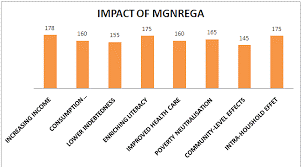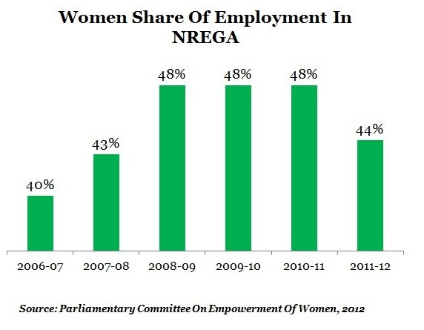MGNRega
Figure 3: No Copyright Infringement Intended
Context:
- Recently, the central government wrote to Jharkhand asking it to ensure strict action for Mahatma Gandhi National Rural Employment Guarantee Act (MGNREGA) irregularities.
Recent Issues:
- Workers: More than 1.59 lakh workers were mentioned in the records, but roughly 75% of them were missing from work sites, according to the data.
- Machines: Beneficiaries were also discovered to have established deals with contractors to use their names on muster lists in exchange for a cut from direct money transfers, and robots were utilised for work designed to produce jobs for people.
- Funds misappropriation: In the last four years, Rs 935 crore has been looted from NREGA initiatives.
About MGNrega:
- Right to Work: Adult members of rural households have a legal right to work under the Act.
- Affirmative action for Women: Women must account for at least one-third of the recipients. Rates must be paid in accordance with the state's Minimum Wages Act of 1948, which specifies wages for agricultural labourers.
- Guarantee of Work in a Timely Manner: Employment must be provided within 15 days of being asked, failing which an 'unemployment allowance' must be paid.
- Decentralized Planning: The Panchayati Raj Institutions (PRIs) are in charge of the planning, implementation, and monitoring of the projects.
- Empowerment of Gram Sabha: Gram Sabhas must recommend the projects to be performed, and at least half of the projects must be carried out by them.
Challenges with MGNrega:
- Ridiculously low wage rate: Currently, MGNREGA wage rates of 17 states are less than the corresponding state minimum wages.
- Insufficient budget allocation:MGNREGA’s success at the ground level is subject to proper and uninterrupted fund flow to the states.
- Regular payment delays: The Union Ministry of Rural Development considers wages paid once the FTO (Fund Transfer Order) is signed by the second signatory. However, delays take place even in the processing of signed FTOs, for which the Management Information System (MIS) does not calculate compensation.
- Workers penalised for administrative lapses: The ministry withholds wage payments for workers of states that do not meet administrative requirements within the stipulated time period
- The banking puzzle: The rural banks are highly de-capacitated in terms of staff and infrastructure and thus always remain hugely crowded.
- Faulty MIS data: There is a growing pile of evidence on how real-time MIS has made MGNREGA less transparent for workers, reduced accountability of frontline functionaries and aided in centralisation of the programme.
- Non-payment of unemployment allowance: There are a huge number of unemployment allowances being shown in the MIS currently.
- Genuine job cards being deleted to meet 100% DBT targets: Genuine job cards are being randomly deleted, as there is a huge administrative pressure to meet 100 per cent Direct Benefit Transfer (DBT) implementation targets in MGNREGA.
- Too much centralisation weakening local governance: A real-time MIS-based implementation and a centralised payment system has further left the representatives of the Panchayats Raj Institutions with literally no role in implementation, monitoring and grievance redress of MGNREGA schemes.
- Administration not honouring local priorities: However, with the administration almost dictating its implementation, it is literally a burden now for the people and especially for the local elected representatives.
Success of MGNREGA:
- Reduced the distress in agriculture & economydue low agricultural productivity & small land-holding size thus provided them better livelihood opportunities.
- Most of MGREGA work is directed towardsbuilding irrigation canals, tanks etc. thus provides resources base for further rural development.
- It has reduced rural distress & intensive urban migration.
- The provisions like work up to 5 km from home, equal wages promotes womenempowerment, gender parity & directed towards backward section of society.
- The programme has generated over 1,980 crore person-days. In theshort span of 10 years that the Act has been in existence, it has generated 19.86 billion person-days of employment benefitting 276 million workers, with more than half the jobs going to women workers and almost a 3rd to members of scheduled castes and scheduled tribes.
- It has resulted into social upliftment for all sections including SC/ST. The percentage of Scheduled Caste workers benefitted under the scheme has consistently been about 20% and of Scheduled Tribe workers has been about 17%.
- The legislation has reduced distress migration in traditionally migration-intensive areas.

Government Reforms:
- Geo Tagging of assets: Geo MGNREGA is a path breaking initiative that uses space technology for geo-tagging all assets created under MGNREGA for improved planning, effective monitoring, enhanced visibility and greater transparency.
- Direct benefit transfer: To further streamline the fund flow mechanism and bring down delay in payment of wages, the Ministry of Rural Development has implemented National Electronic Fund Management System (NeFMS) in 21 States and 1 Union Territory.
- Simplification of MGNREGA: Initiative has been taken to simplify MGNREGA through issuance of Annual Master Circular (AMC) for FY 2016-17 by superseding 1039 circulars/advisories issued earlier.
- Reduction in Number of Registers: Reduction in number of Registers being maintained at Gram Panchayat level to seven simplified Registers from an average of 22 Registers has been implemented.
- Provision of Independent Social Audit: The programme is progressing towards a more independent and empowered system of Social Audit and Internal Audit to ensure growth with accountability through a trained community cadre of social auditors drawn from women SHGs.
- Up skilling of Labour: The Ministry has taken up skill development of the MGNREGA workers through initiatives like Bare Foot Technicians and Project LIFE (Livelihood in Full Employment) in order to move them up the skilling ladder.




1.png)
